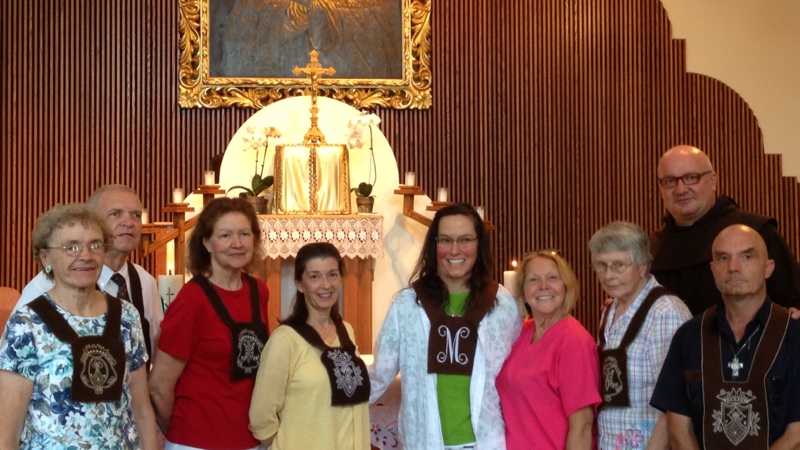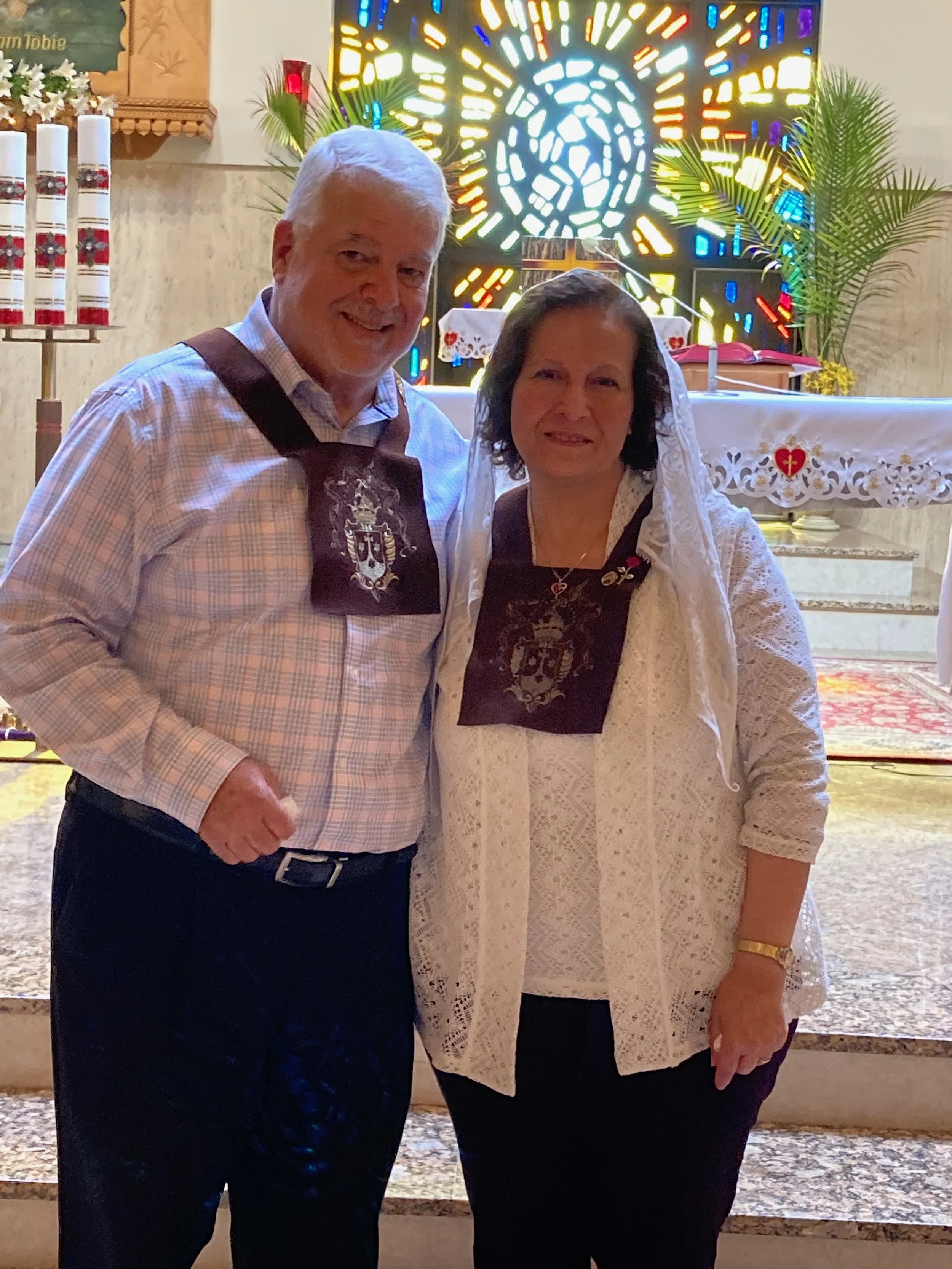About the Secular Order of Discalced Carmelites
The Secular Order of Discalced Carmelites of Our Blessed Lady of Mount Carmel and St. Teresa of Jesus (Secular Order or OCDS) is a community consisting of Roman Catholics who serve God in the spirit of Carmel by adhering to the Constitution of the Order. ("Discalced" refers to reformed, barefoot, or sandal-wearing Carmelites).
While under the protection of Our Lady of Mount Carmel, we seek interior union of God through contemplative prayer and try to model our lives on that of Our Lady. We wear the brown scapular given to St. Simon Stock as the symbol of our loyalty and dedication to Our Lady's presence in our lives.
Origin and Status within the Church
"The Secular Order "is the successor and continuator of the Third Order of Carmel established in 1452 by Pope Nicholas V.
"The Secular Order...is an ecclesiastical association. It possesses juridical personality and acts on the basis of the provisions of the Code of Canon Law, the Constitutions of the Secular Order of Discalced Carmelites, the present statutes, and other provisions regarding the Secular Order. It is an integral part of the Order of Discalced Carmelites and is legally subject to the Provincial Superior of the Kraków Province...who may act through his Delegate."*
CARMELITE PRIESTS, SISTERS, AND LAY PERSONS
"Carmelite Seculars, together with the Friars and Nuns, are sons and daughters of the Order of Our Lady of Mount Carmel and St. Teresa of Jesus. As a result, they share the same charism with the religious, each according to their particular state of life.
It is one family with the same spiritual possessions, the same call to holiness, and the same apostolic mission. Secular members contribute to the Order the benefits proper to their secular state of life."*
CARMELITES IN NORTHWEST INDIANA
In 1949, following the Second World War, Polish Carmelite priests came to Hammond, Indiana, to serve the immigrant Polish communities in the Chicago area. Later in 1952, the priests bought land in Munster and began to build the shrine.** After 1956, more contact with Poland became possible and many Carmelite Fathers from Poland joined the Munster Community. In 2004, St. John Paul II bequeathed his "Golden Rosary" and Apostolic Blessing to the Carmelite Fathers and visitors to the shrine. Today, the Carmelite Fathers and Brothers continue to serve the Polish-American Community.***
The Order of Secular Carmelites (OCDS) of Our Lady Queen of Peace Community of Northwest Indiana was formed on November 8, 1987 with Father Guy Lofe, OCD, as Spiritual Director and Mr. Joe Jesewski as President. As such, it received official designation from Rome on May 27, 1988. **** At present, the OCDS Community has 24 active members from Indiana and Illinois.
*Constitutions of the Secular Order of the Teresian Carmel, p. 2.
**Source: http://www.chicagotribune.com/suburbs/post-tribune/news/ct-ptb-bicentennial-monastery-st-0306-20160304-story.html
***Source: http://carmelitefathers.com/about-us/
****Fr. Joseph Ivans, personal correspondence, November 4, 1997
Solemn Scapular
The scapular is worn by all Carmelites as a symbol of devotion to Our Lady and the Carmelite Order. "The external sign of belonging to the Secular Order of Discalced Carmelites is the solemn scapular consisting of two rectangular pieces of brown fabric, measuring 25 x 18 centimeters, draped over the front and back, and connected by ribbons. The blessed solemn scapular is imposed on the candidate by the priest during the ceremony of admission to the period of formation as a 'sign of the Carmelite habit' (Ritual 24) with the summons to wear it worthily and imitate Mary in serving Christ."***
Members wear the solemn scapular at meetings, the profession of promises and vows, and at other celebrations. The Council of the Community makes the decision in this matter.***
Daily Scapular
"Secular Carmelites are obliged to wear the small cloth scapular daily, for which the scapular medal may serve as a substitute."****
***Statutes of the Carmelite Order (2017), #17, p. 6.
****Statutes of the Krakõw Province of the Secular Order of Discalced Carmelites (2017), #19, p. 6.
ANABELL
Anabell had cancer which prevented her from entering the Secular Order as an ordinary member. She had a great desire to participate in the mission of the Carmelite Order and to support it with her prayers as well as her suffering. She was accepted as a cooperative member in 2013 and passed away on the feast of St. Teresa of Ávila in 2015.
In her petition to be received as a cooperative member of the Secular Order of Discalced Carmelites of Our Lady of Mount Carmel and St. Teresa of Jesus, Anabell wrote the following:
"I have a joyful desire to participate in the mission of the Carmelite order supporting it through my prayers, as well as offering any suffering encountered throughout the totality of my life, especially the suffering related to cancer, which currently impedes me from pursuing entrance into the Secular Order as an active, ordinary member. Also, if there is any need for artistic services that the Secular Order might need, I offer these as well, to the extent that my physical health permits.
I have a zealous longing to serve Our Lady of Mt. Carmel to help save souls and live my life according to the spirituality of Carmel. Also, I deeply wish to be in community with all of the Carmelite saints and with all those currently serving Carmel, for all eternity. I thank all the members of the Secular Order, as well as the Carmelite Fathers, for their prayers and concern for my health. I send to each one my gratitude, love, and prayers, too."
Anabell (in the green shirt) in the middle following her investiture as a Secular Carmelite. Our beloved late president, Eleanor, is the second person to Anabell's right and below on the far left.
Father Paul visits Lorraine
Lorraine was our oldest member of the Secular Carmelites. She made her Final Promises as a Secular Carmelite in 1995. She crocheted hundreds of items for the children in the Carmelite Home each year. Lorraine had a beautiful and holy attitude toward life, her Catholic faith, and the Secular Carmelites. Lorraine went to the Lord on October 30, 2020.
Secular Carmelites: The Basics
Age requirements: Between 18 and 55* years
Say the Divine Office twice daily: Morning and Evening Prayers
Be present at all community meetings** from beginning of Vespers at 4:00 pm (if not fully professed) to end after Formation at 7:00 pm
Wear the Solemn Scapular to meetings and at other events as directed by Council and the small Scapular daily.
Frequent attendance at Holy Mass and reception of the Sacrament of Reconciliation
Pay annual dues of $30.00.
To the degree possible, abstain from meat on Solemnities of St. Joseph, Our Lady of Mt. Carmel, St. Teresa of Jesus, the Immaculate Conception, and St. John of the Cross.
Remembrance in prayer of all deceased Carmelites
Daily devotion to the Blessed Mother, such as the Rosary
Live according to the Gospels and Beatitudes
*May extend to 60 years of age with special dispensation
**A community meeting consists of Vespers and Exposition of the Blessed Sacrament, Formation, and the Meeting itself. Missing any part of it requires an excused absence.









































